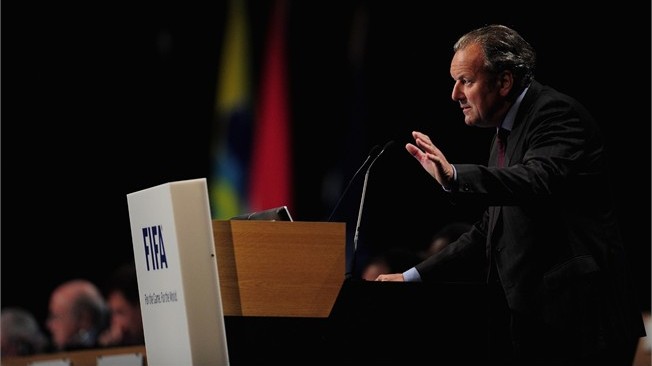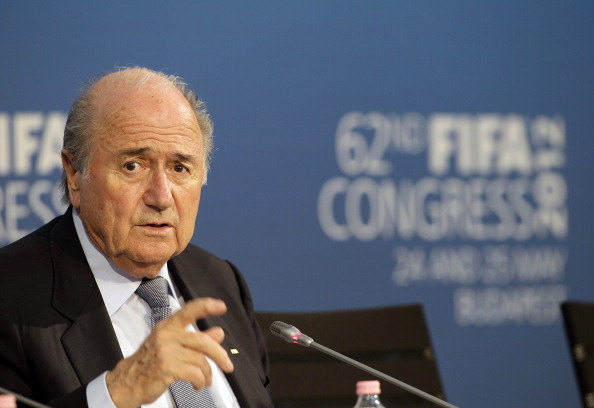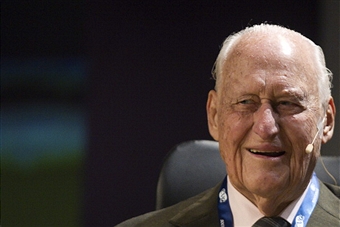By Andrew Warshaw
June 7 – The infamous ISL corruption files, which have cast a dark shadow over much of Sepp Blatter’s 14-year FIFA Presidency, could finally be made public by the end of October, insideworldfootball has learned.
Under his two-year reform process, Blatter has repeatedly promised to release the dossier citing exactly who among his hierarchy took kickbacks – and how much – from FIFA’s former marketing partner in return for granting lucrative World Cup television contracts.
The all-important files have been blocked because of an ongoing appeal to the Swiss federal courts by unidentified parties, understood to be former FIFA President João Havelange (pictured above) and his one-time son-in-law Ricardo Teixeira, who recently stepped down from all his prominent footballing positions including the FIFA Executive Committee, President of the Brazilian Football Confederation (CBF) and head of Brazil 2014.
Now, however, Mark Pieth, the Swiss trouble-shooting professor parachuted in to clean up FIFA, has told insideworldfootball he expects the case to be resolved one way or the other within the next four months.
“I can’t say precisely when the courts would make a final decision on opening the files but my educated guess would be some time between now and October given how long they have been in possession of the relevant documentation,” Pieth predicted.
Although the courts could decide to permanently protect the anonymity of the alleged guilty parties, Pieth hopes this will not be the case.

“As a professor of criminal law I think transparency is important especially in non prosecution agreements,” said Pieth (pictured above), appointed last November to lead FIFA’s anti-corruption programme after a year of unprecedented scandal.
“The public should know what was agreed on and why.
“I would very much like to see the ISL files published but the outcome is open and really depends on what the court decides.
“There is no guarantee that the files will be published.”
Havelange, who is recovering from a bacterial infection that hospitalised him for several days, resigned from the International Olympic Committee (IOC) last year, thus avoiding possible suspension over his alleged role in the scandal involving ISL, which went bankrupt in 2001 with debts of £300 million ($464 million/€370 million).
The dossier details a May 2010 deal in which two officials admitted taking backhanders in the 1990s.
They repaid 5.5 million Swiss francs (£3.7 million/$5.6 million/€4.6 million) on condition their identities remained secret.
However much Blatter (pictured below) trumpets FIFA’s reform process, the organisation’s credibility cannot be totally restored unless and until the ISL saga is satisfactorily resolved.

At the FIFA Congress in Budapest last month, Pieth said it was imperative the dossier be published – but in the correct way.
“We want to see it, we’ve asked for it,” he demanded.
“Since the authorities do not appear ready to give it to us there is a real problem.”
Pieth warned there could be serious legal implications for FIFA if it acted unilaterally.
“I don’t think it would be advisable at all if FIFA handed out the document on their own and I would advise against it,” he said.
“Private redacting is no good.
“This has to be out in the open.”
Blatter repeated in Budapest that FIFA’s hands were tied until the Swiss courts make a final decision.
“We can’t do anything,” he insisted.
“We have already said that we will open it as soon as possible because we have nothing to hide.”
Contact the writer of this story at zib.l1745201309labto1745201309ofdlr1745201309owedi1745201309sni@w1745201309ahsra1745201309w.wer1745201309dna1745201309
Related stories
May 2012: ICC chief prosecutor Luis Moreno Ocampo set to lead FIFA ethics team
May 2012: Have guts, do the right thing and back reforms, Pieth urges FIFA Congress
April 2012: FIFA unveils hard-hitting new Code of Conduct to abolish corruption
April 2012: European politicians pour scorn over Sepp Blatter’s handling of ISL scandal
April 2012: Andrew Warshaw – Until FIFA learns from its tainted past Pieth’s reform proposals carry little weight

